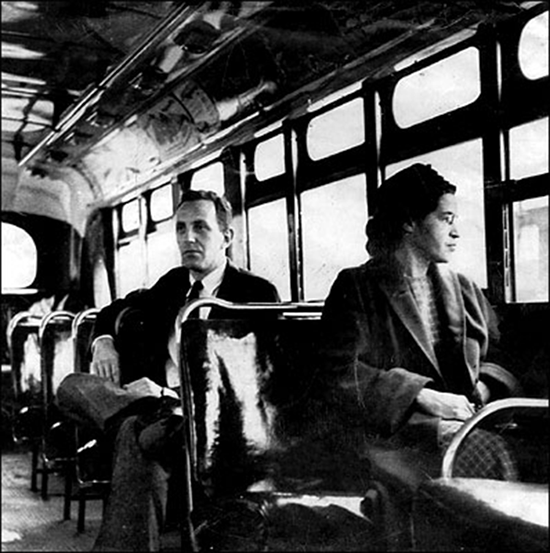Produced for K-12 educators, Teach This Poem features one poem a week from our online poetry collection, accompanied by interdisciplinary resources and activities designed to help teachers quickly and easily bring poetry into the classroom. The series is written by our Educator in Residence, Dr. Madeleine Fuchs Holzer, and is available for free via email.
Featured Poem
Rosa Parks on a Bus in Montgomery, Alabama, December 21, 1956

New York World-Telegram and the Sun Newspaper Photograph Collection, Library of Congress, Prints & Photographs Division, NYWT&S Collection, LC-DIG-ds-07979.
Classroom Activities
- Project the photograph of Rosa Parks on the bus without telling your students who she is. Ask them to look at the photograph carefully and write down what they see. It is not enough for them to write “I see a man and a woman.” They have to write as many details as possible about what they see. If they immediately recognize the subject of the photograph, ask them to write down what elements of the photograph tell them who this person is.
- Ask your students to get in pairs and to share the details they noticed. What do they think is the situation in the photograph? What details in the photograph support this interpretation?
- Whole-class discussion: Ask your students if they know about Rosa Parks. If some students do know, have them tell the rest of the class who she was. Add details, as necessary. If no one knows, tell them the story of the Montgomery Bus Boycott, or direct them to the primary resources from the Library of Congress.
- Project the poem “Making History” so all of your students can see it. Ask them to read the poem silently and write down all the words and phrases that jump out at them. Ask them to write down the questions they have after reading the poem.
- Ask one student to read the poem aloud, while the other students listen and write down any new words, phrases, or questions. Ask another student to read the poem aloud and have the listening students follow the same process.
- Ask your students to get into groups of four to share their lists and help one another answer their questions. This may involve some individual/group research to discover all the “firsts” mentioned in the poem.
- Whole-class discussion: What is the speaker in the poem telling us is necessary to “make history?” What are the “little white lies” about which she is speaking?
